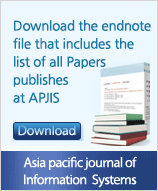The Journal for Information Professionals
Asia Pacific Journal of Information Systems (APJIS), a Scopus and ABDC indexed journal, is a
flagship journal of the information systems (IS) field in the Asia Pacific region.
ISSN 2288-5404 (Print) / ISSN 2288-6818 (Online)
Editor : Youngsok Bang
Information for Authors
- Review Process
-
Review Criteria
APJIS uses the following criteria to review manuscripts: originality, conceptual significance, academic significance, research methodology, structure and coherence, expression, and theoretical validity. Upon submission, manuscripts are checked for their completeness and adherence to our editorial policies and the criteria listed below, whereafter detailed comments and feedbacks are made regarding strengths and weaknesses, requests for author revision and reviewers' final recommendations. The review criteria are as follows.
Originality: Does the work distinguish itself from others and is there a clear difference between prior literature and the work in terms of topic, theory, methodology, overall logic and/or implication?
Conceptual Significance: Does the work represent an important contribution to knowledge? Does the work lead to the discovery of new empirical phenomena, in-depth understanding of the phenomena, and extend or challenge IS theory?
Academic Significance: Does the work contribute to our understanding of current problems or challenges faced by IS or other researchers? Does the work deliver a meaningful lesson to the reader?
Research Methodology: Does the work use scientific methods? Is the work well executed, from provision of research propositions and design artifacts to interpretation of results?
Structure and Coherence: Is the flow of ideas in the work logical? Is the work presented at an appropriate level of sophistication in both content and design?
Expression: Does the work adopt a professional style and tone? Is it clear and effective in its use of language appropriate to the readership of the journal?
Theoretical Validity: Does the work adhere to generally accepted codes of scientific ethics
Review Process
The editor-in-chief first screens the submission to assess whether the manuscript complies with the editorial format of APJIS. Next, the editor-in-chief selects an associate editor and sends the manuscript to the associate editor to request the nomination of reviewers. The editor-in-chief then notifies the first or corresponding author about receipt of the manuscript.
The associate editor nominates at least two reviewers with a high level of expertise in the topic area of the manuscript and sends the manuscript to them. The associate editor notifies the editor-in-chief of the list of reviewers.
The panel of reviewers informs the associate editor of the review results.
The associate editor reports the review team's decision to the editor-in-chief. In general, the first round of review process will take around one month.
The manuscript is evaluated based on a five-point scale from "strongly disagree," "disagree," "neither agree nor disagree," "agree" to "strongly agree" according to each criterion mentioned above. Next, the reviewers decide on the disposition of the manuscript, which may be one of "accept," "conditionally accept," "revise and resubmit," "reject," "reject but resubmission" or "submission to another journal," and make a final recommendation to the associate. "Conditionally accept" means that the manuscript will be accepted without another full review process on the condition that the author has completed the revision requests and the changes made by the author are satisfactory. In this case, the associate editor sends an inquiry to the review team to certify that the revised work is acceptable enough for final appearance in the journal. "Revise and resubmit" means that the manuscript will be sent back to the author with the reviewers' suggestions for improvement. In this case, the revised work will go through a review process again after author revision. "Reject but resubmission" means that although the manuscript has a potential, it is not easy for authors to successfully reflect all reviewers' suggestions within the limited time. In this case, the revised work will be considered as a new submission. "Submission to another journal" means that the reviewers deem it more appropriate to forward the submitted manuscript to another journal whose research specification better matches with the work than do those of APJIS
If the review result is "conditionally accept" or the revisions requested are inconsequential, the manuscript will be conditionally accepted. The associate editor returns the manuscript and requests author revision based on the reviewers' comments and feedback. The author then sends the revised work to the associate editor, who asks the review team whether the changes made by the author are satisfactorily in compliance with the recommendations requested. The review team informs the associate editor of the final review result, and the associate editor reports it to the editor-in-chief.
If the review result is "revise and resubmit" or the revisions requested are substantive, the manuscript will be sent out for review again. The associate editor returns the manuscript and requests author revision based on reviewers' comments and feedback. The author sends the revised work to the associate editor and the associate editor solicits additional review from the review team. The review team informs the associate editor of the final review result, and the associate editor reports it to the editor-in-chief. This process will be repeated as necessary. However, in most cases, a final decision will be made before or on the third round of review.
When accepted for publication, the journal manager sends author the final guide mail with Copyright Transfer Agreementbefore publication. After submission of final work with the Copyright Transfer Agreement, journal manager starts editing the journal based on the final script. Once editing of the journal is completed, the journal manager sends the edited version of the journal to the author. In request of the publication certificate, the journal manager is responsible for transferring the certification of publication with the volume, issue, and publication date of the prospective issue indicated.
APJIS-Copyright Transger Agreement-form
Home l Site Map l Abstracting/Indexing l FAQ l Publisher l Contact Us l Admin Login
© 2013 The Korean Society of Management Information Systems. All rights reserved.












 Submission of a paper to the Asia Pacific Journal of Information Systems for possible publication means that the authors certify that the manuscript has not been published previously nor is currently submitted for publication elsewhere. All legal responsibilities and duties about the contentss of the work belong to the authors.
Submission of a paper to the Asia Pacific Journal of Information Systems for possible publication means that the authors certify that the manuscript has not been published previously nor is currently submitted for publication elsewhere. All legal responsibilities and duties about the contentss of the work belong to the authors. Submitted manuscripts are reviewed by at least two reviewers nominated by the editorial board.
Submitted manuscripts are reviewed by at least two reviewers nominated by the editorial board. If all reviewers agree to recommend the publication of a manuscript, the manuscript will be accepted for publication. If not, the editor-in-chief confers with the associate editor who handles the manuscript and oversees deliberation in the editorial board meeting.
If all reviewers agree to recommend the publication of a manuscript, the manuscript will be accepted for publication. If not, the editor-in-chief confers with the associate editor who handles the manuscript and oversees deliberation in the editorial board meeting. The journal can request minor and/or major revisions to the manuscript.
The journal can request minor and/or major revisions to the manuscript. Copyrights to make digital and/or hard copy of, republish, and redistribute part or all of the work belong to the Asia Pacific Journal of Information Systems. All legal issues related to copyrights are the responsibility of the authors.
Copyrights to make digital and/or hard copy of, republish, and redistribute part or all of the work belong to the Asia Pacific Journal of Information Systems. All legal issues related to copyrights are the responsibility of the authors.  Preparation and Storage of Related Documents
Preparation and Storage of Related Documents






